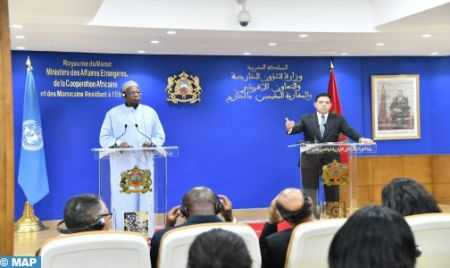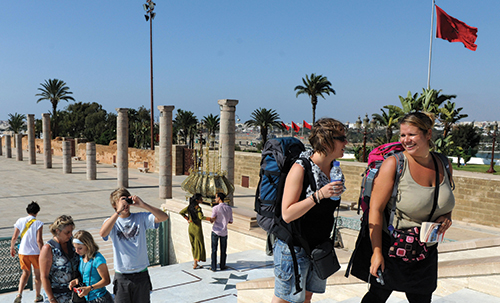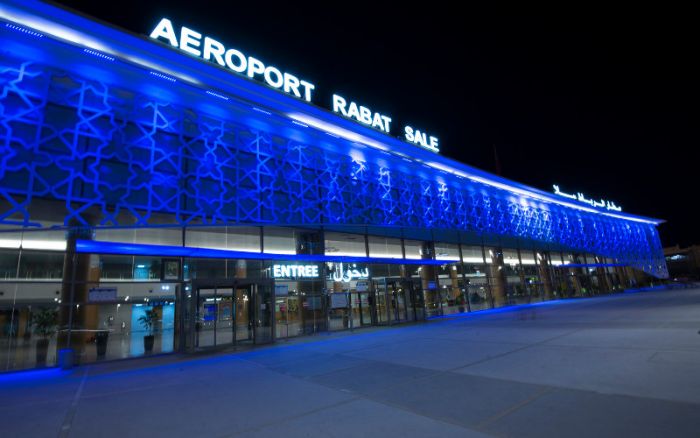The Special Representative of the UN Secretary General for Libya, Abdoulaye Bathily, highlighted, from Rabat Thursday, Morocco’s role in the success of the inter-Libyan dialogue, particularly through the Kingdom’s commitment to the electoral process in this country.
“We are delighted with the results achieved thanks to Morocco’s support and we hope that the Kingdom will continue to support this political process, especially as we are in the process of implementing the organic laws of elections and related agreements,” Bathily, who is also the head of the United Nations Support Mission in Libya (UNSMIL), said at a joint press briefing with Minister of Foreign Affairs, Nasser Bourita.
He noted that monitoring the implementation of these laws in a country plagued by tensions and conflicts like Libya necessarily requires reaching agreements based on good faith between political stakeholders.
In this regard, Bathily stressed the need to reach “consensual solutions as quickly as possible,” given that “the current situation cannot continue any longer and involves major risks.”
Despite a regional context marked by tensions, the Libyan people and the international community aspire to promote peace in this country, the UN official underlined, highlighting the repercussions of this tension on security in the region and the world, given the geostrategic position of Libya.
Bourita, on his part, underlined that Morocco continues to support the UN efforts to settle the institutional crisis in Libya.
He said the instructions of King Mohammed VI are clear in supporting all the efforts of the UN Special Representative aimed at getting Libya out of this institutional crisis that it has been facing for several years.
Morocco still considers that holding elections remains the most appropriate solution to the institutional crisis, affirming that these elections should constitute the starting point of a new phase in this brotherly country, focused on stability, legitimacy and meeting the needs of the Libyan people, the Moroccan official said.
“There is now a legal framework thanks to the meetings held in Bouznika which resulted in the promulgation of electoral laws, which were not in place when the elections were announced on December 24, 2021,” Bourita said, adding that this legal framework, although not ideal, remains the best possible option for holding these elections.
The minister also recalled that the Kingdom, which hosted several meetings between the Libyan parties, has continuously endeavored to bring together their points of view without interfering in their internal affairs.
“Today, the Kingdom is willing to support the momentum that Mr. Bathily wishes to launch in order to enrich the existing legal framework through institutional political compromises,” he said, adding that the implementation of these compromises will make it possible to launch the phase of organizing the elections.
He reiterated that Morocco constantly stresses that the Libyan crisis settlement will not come from outside, but from the Libyans themselves, which has earned the Kingdom credibility with the Libyan parties.
“The Kingdom is ready to support Mr. Bathily in the advancement of the political process in Libya,” the minister underlined, expressing hope that the relevant ideas could materialize into initiatives, then into compromises and solutions which would lead to holding the elections.
Following intensive consultations with a broad range of Libyan stakeholders as part of his efforts to advance the political process, Abdoulaye Bathily has extended invitations to key Libyan institutional stakeholders to attend a meeting in the coming period to reach a settlement on the politically contested issues pertaining to the implementation of the electoral process. To this end, the SRSG has requested the institutional stakeholders to designate representatives to participate in a preparatory meeting, UNSMIL said in a press release made public Thursday.
At this preparatory meeting, the designated representatives of the Presidential Council, House of Representatives, High Council of State, Government of National Unity and the General Command of the Libyan National Army will discuss the date, venue, and agenda of the meeting of their Principals. They will also identify the outstanding issues that need to be resolved to enable the High National Elections Commission to commence the implementation of the electoral laws issued by the House of Representatives (HoR).
“For the first time since elections failed to proceed on 24 December 2021, Libya now has in place a constitutional and legal framework for the elections to move, in good faith, to the next stage in order to achieve our shared goal to deliver free, transparent and inclusive elections for the Libyan people,” SRSG Bathily was quoted in the press release as saying.



